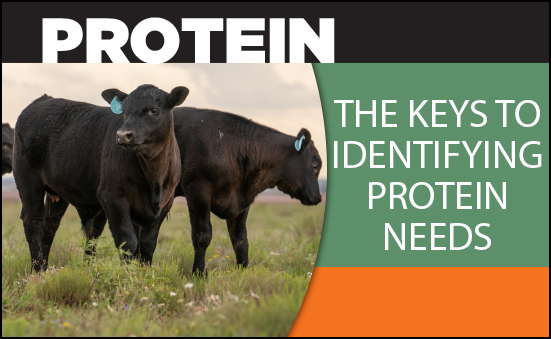Protein is essential. Not only do ruminants both large and small depend on it for good digestion and proper rumen function, but animals in general, rely on protein for adequate meat and milk production. Protein is necessary to supply the ammonia needed for microbial growth and to provide the amino acids needed for absorption from the small intestine. A protein deficiency can limit microbial activity, microbial protein synthesis and rate of digestion. In turn, these can impact feed and energy intake. Finally, if an animal receives insufficient amounts of protein, meat and milk production can be dramatically reduced.
However, spending money on protein supplementation may not always be the best investment for a producer to make. You need to know when to supplement protein and how much to provide to make it a wise investment in your operation.
Follow these three helpful tips to ensure proper protein supplementation.
- Identify Protein Needs.
Requirements for protein vary throughout the year and depend on the animal’s stage of production. A cow’s protein requirements will vary from about 9% to 12%, while a doe or ewe’s protein requirements range from 7% to 15%, depending on where she is in the production cycle. Requirements are lowest post-weaning to late gestation and continue to increase as the female gets closer giving birth. Protein requirements are highest immediately post-parturition due to the increase in protein needed for milk production during lactation.
- Identify What is in Your Feed.
You know the stages of production when additional protein is required, but do you know how much protein to supplement with? Before you start a supplementation program, you need to know exactly what they are already consuming. Protein can come from pasture, stored forages and grain. By understanding the nutrient profile of your available feedstuffs, you can better identify what supplements you need in your feeding program to meet nutrient requirements and optimize animal performance. BioZyme® Inc. offers forage testing and ration balancing, free to its customers, to help them gain a better understanding of what they are missing in their livestock diets. If you are interested in participating, please contact your Area Sales Manager.
- Identify the Protein Supplement that Best Fits your Scenario.
Producers have options when it comes to choosing the protein that will work best with their management practices. BioZyme offers its protein supplements in a tub or meal form to accommodate various management scenarios, allowing for maximum convenience along with improved animal performance. In addition to the added protein, the Amaferm® found in BioZyme products increases the rate of digestion, allowing animals to meet their nutrient requirements faster and on less feed. Increased forage digestion provides for greater microbial growth and production of microbial protein to provide the animal with more protein for growth, lactation and reproduction. Furthermore, with Amaferm in the diet you effectively reduce the need to supplement large amounts of protein because you are making more of the protein in the forage available to the animals.
